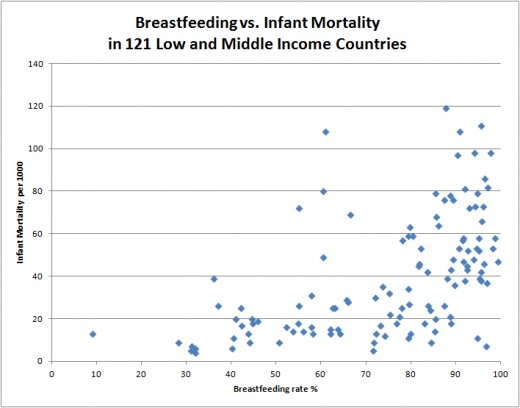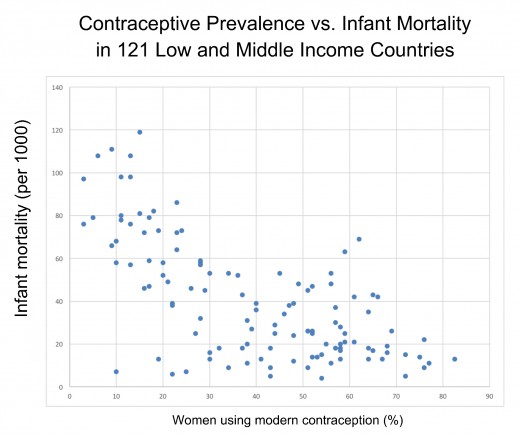On Friday I wrote about the Lancet series on breastfeeding. The authors claim that exclusive breastfeeding around the world could save 800,000 babies each year. I pointed out a paradox that undermines the authors’ contention: the countries with the highest infant mortality rates already have the highest breastfeeding rates.
We shouldn’t be surprised. There once was a time that breastfeeding rates were 100% everywhere and the infant mortality rate was … hideous! If breastfeeding didn’t protect babies for most of human existence, why would it suddenly start protecting infants now?
[pullquote align=”right” cite=”” link=”” color=”#521C4E” class=”” size=””]Increased breastfeeding rates might theoretically decrease infant mortality, but I can’t find any real world evidence that it does.[/pullquote]
In other words, there’s no real world evidence for the purportedly lifesaving benefits of breastmilk. So what are the authors’ basing their claim upon? They base their claims on projections from data gleaned in small studies. Indeed, as far as I know, every assertion that increasing breastfeeding rates will save lives or money is based on projections, never on actual experience. Indeed, as far as I can determine, there is no real world evidence that breastfeeding saves lives or money on the scale estimated by certain researchers.
That’s an important point because there is considerable evidence that other parameters and public health measures do do result in decreased infant mortality.
Here’s the scatter chart of breastfeeding rates vs. infant mortality that I presented on Friday. It is based on data from 121 low and moderate income countries.
As you can see, as the breastfeeding rate rises, the infant mortality rate not only doesn’t fall, it actually rises, too.
Now let’s look at the impact of per capita GDP (gross domestic product), a measure of income, on infant mortality in these same low and middle income countries.
The scatter chart looks very different. It is easy to see that as income rises, infant mortality rates fall. It’s the exact opposite of what we see with breastfeeding rates.
How about the impact of relatively clean water (including public taps, protected wells, and rainwater)? Here’s a scatter chart of access to clean water vs. infant mortality. As access to clean water approaches 100%, infant mortality drops precipitously. That’s also in direct contrast to what we see with breastfeeding.
Finally, let’s look at access to modern contraceptive methods. The scatter chart below plots the proportions of sexually active women using modern contraception vs. infant mortality. Yet again we see that as access to contraception rises, infant mortality falls.
No doubt access to clean water and access to modern contraception are, in part, a function of per capita income, but they are certainly more firmly tied to reducing infant mortality than breastfeeding.
There’s nothing wrong with breastfeeding, of course. But it’s not a magic lifesaving elixir, no matter how much lactivists insist that it is. While increasing breastfeeding might theoretically decrease infant mortality, I can find no real world evidence that it actually does.
That’s not what I thought prior to reading the Lancet papers, but that’s actually what the data shows. Increasing breastfeeding rates are actually associated with INCREASED infant mortality.
It’s not because breastfeeding causes infant deaths; it doesn’t. It’s because babies die due to malnutrition (of themselves or their mothers), vaccine preventable illnesses, lack of medical care and war. Breastfeeding can’t fix those things and it is foolish (or worse) to pretend that for women living in abject poverty, their babies’ survival depends on breastfeeding.






